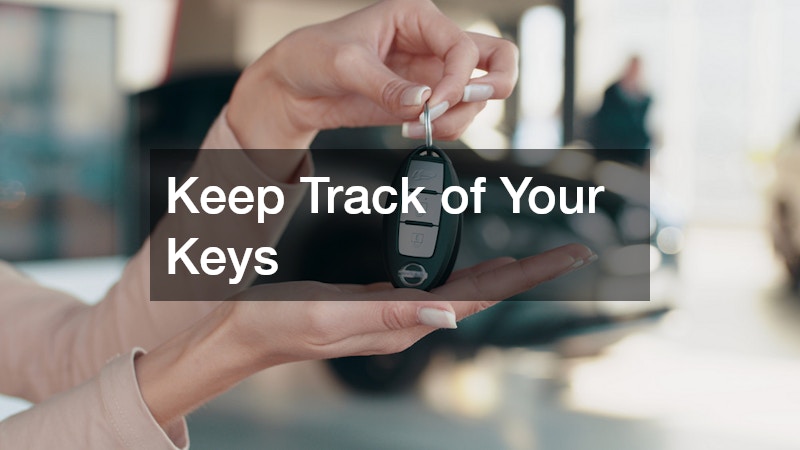Becoming a new driver is an exciting milestone that brings a newfound sense of freedom and independence. However, alongside this excitement comes a substantial responsibility to ensure both personal safety and the wellbeing of your vehicle. This article outlines 10 car essentials for new drivers that are critical for effective car ownership, maintenance, and overall driving experience.
From keeping track of your keys to understanding how to budget for repairs, equipping yourself with the right knowledge and tools can make your journey smoother. When you’re well-prepared, you minimize risks and maximize enjoyment behind the wheel. Here are ten vital car essentials to keep in mind as you navigate this new chapter in your life.
Each of these essentials is designed to aid new drivers in building good habits, fostering responsibility, and ensuring that they are fully equipped to deal with the challenges that can arise while on the road. So buckle up and let’s explore these essential tips that every new driver should consider!
Keep Track of Your Keys

One of the simplest yet most crucial car essentials for new drivers is developing a habit of keeping track of your car keys. Losing your keys can lead to frustrating situations, leaving you stranded and potentially late for important commitments. By ensuring that you always know where your keys are, you can avoid these unnecessary inconveniences.
Additionally, having a spare car key easily accessible is highly recommended. This can save you time and hassle if you misplace your primary key, eliminating the need for costly car key replacement services. Consider leaving a spare key with a trusted friend or family member, or investing in a hide-a-key box that can be discreetly placed outside your vehicle.
Furthermore, if you do find yourself in a situation where you must purchase a replacement key, understanding the process can save you money and effort. Many dealerships and auto repair shops offer key programming services, but it’s crucial to research your options. Take note of any unique features your key may have and communicate these with the service provider to ensure you receive the correct replacement.
Have a Backup Plan
Every new driver should have a backup plan in case their vehicle breaks down or they find themselves stranded on the road. This is one of the most important car essentials for new drivers to learn. Keeping a reliable roadside towing service in your contacts is an invaluable part of your safety kit. Knowing whom to call when you need help can provide peace of mind and help you feel more secure on the road.
When selecting a towing company, check local reviews and ask friends for recommendations to find a service you can trust. Many roadside assistance programs can be added to your car insurance policy, offering you reliable help whenever you face such situations. This means you’ll not only save money but also have access to additional support, such as emergency fuel delivery and tire changes.
It’s also wise to familiarize yourself with emergency protocols before leaving for long trips. Make sure you have essential supplies in your vehicle, including a first-aid kit, flashlight, and basic tools, to help you manage unexpected incidents. With these preparations, you’ll be better equipped to handle unforeseen challenges that may arise while driving.
Find a Trustworthy Body Shop
Finding a reliable auto repair shop should be one of the first car essentials for new drivers. Researching local auto body shops can save you time, money, and frustration in the future. Learn from other drivers’ experiences and look for reviews from trusted sources to identify shops with skilled technicians.
Moreover, it’s beneficial to visit potential auto repair shops in person. Establishing a personal connection with the staff can help you feel more comfortable leaving your vehicle in their hands. You can ask questions about their certifications and repair processes to ensure they align with your expectations and requirements.
Having a trustworthy body shop on speed dial allows you to get quick assistance when needed. This relationship can also lead to perks such as priority service or special discounts on repairs. Remember, a good mechanic will not only fix your car but will also educate you about its upkeep, ensuring its longevity and performance.
Provide a Detailed Report

When taking your vehicle to an auto body mechanic for repairs, providing a comprehensive report of the issues you’re experiencing is one of the most crucial car essentials for new drivers. Being clear about your car’s symptoms and any warning lights on the dashboard ensures that the mechanic understands your specific concerns. The more information you can provide, the more accurately they can diagnose and fix the problem.
Details like how long the issue has persisted, any unusual sounds, or changes in performance can be vital clues that aid in the repair process. Taking notes about incidents leading up to the problem can also be beneficial. Additionally, if you’ve conducted any initial troubleshooting, share that information with your mechanic as well.
An informed mechanic can better address issues and recommend preventive measures to avoid future complications. Accurate communication fosters a productive relationship between you and the service provider, ensuring you receive the most effective care for your vehicle. Ultimately, transparency during the inspection and maintenance process guarantees you get the best service possible.
Budget for Repairs
Managing your finances responsibly as a new driver requires understanding the importance of budgeting for auto repairs. Car ownership comes with various expenses, and unexpected repairs can quickly derail your financial plans if you are not prepared. One of the most critical car essentials for new drivers is having a dedicated budget for car repairs. Doing so alleviates stress and gives you the peace of mind to take care of issues promptly.
Begin by researching typical maintenance costs based on your vehicle’s make and model. Understanding the average price range for essential repairs helps you set realistic financial expectations. Allocate a certain amount each month towards your car repair fund to accumulate savings that will be available for emergencies.
Additionally, it is wise to perform regular vehicle maintenance checks to minimize the likelihood of unexpected repairs. Frequent oil changes, tire rotations, and brake inspections can go a long way toward keeping your car in top shape. This proactive approach not only extends your vehicle’s life but can ultimately save you money by preventing major repair expenses down the line.
Report All Incidents
New drivers must understand the significance of reporting all incidents, including minor accidents, to your car insurance agents. Even if the damage seems negligible, informing your insurance provider ensures that all necessary documentation is completed. This proactive measure can simplify your claims process and help you avoid increases in your rates when it comes time to renew your policy.
Ensure you take clear photographs of any damage and gather information from involved parties, including contact details and insurance information. This documentation is critical for a thorough assessment when filing claims. Moreover, familiarizing yourself with your insurance policy can help you understand what is covered and what you may be liable for should accidents occur.
Additionally, regular communication with your insurance company aids in building a positive relationship. They can provide tailored advice based on your driving habits and develop a coverage plan that best suits your needs. Ultimately, transparency and open lines of communication help create a safer driving experience.
Make Driving Accessible

Accessibility is another vital consideration and one of the significant car essentials for new drivers, particularly for individuals with disabilities. Understanding available modifications, such as car hand controls and steering wheel covers, can notably enhance the driving experience for those with specific needs. Implementing these adjustments can provide a greater sense of independence and comfort behind the wheel.
If you or someone you know requires specific modifications, consult with professionals who specialize in adaptive driving equipment. They can assess your needs and recommend suitable solutions for improved accessibility. Testing out different options and modifications is essential to determine what’s most comfortable and effective for the driver.
Furthermore, many local car repair shops may offer installation services for these modifications. Developing a relationship with a knowledgeable mechanic can ensure that adjustments to your vehicle are made properly and safely. Whatever your needs, it is crucial to prioritize accessibility in your driving experience as you implement these car essentials for new drivers.
Wash Your Car Regularly
Regularly washing your car is more than just about aesthetics; it plays a vital role in maintaining the long-term health of your vehicle. Road salt, dirt, and grime can accumulate on your car and cause corrosion over time. By keeping your car clean through consistent car washes, you’re actively protecting your investment.
Moreover, establishing a car wash schedule can help you remember to keep your vehicle clean and in good shape. Consider incorporating this step into your routine, perhaps washing your car every other week or once a month, depending on local driving conditions and weather. The costs associated with washing your car can be negligible compared to potential repair bills resulting from neglect.
Investing in quality car care products, such as wax and polish, can also extend your vehicle’s paint life and resale value. While frequent trips to a self-service or automatic car wash may suffice, consider taking the time to hand-wash your vehicle occasionally for a more thorough clean. Remember, a clean car is not only aesthetically pleasing but also reflects your care and responsibility as a driver.
Repair Cracks or Dents
Another essential practice for new drivers is promptly repairing any cracks or dents in your vehicle. It’s easy to overlook minor damage, but neglecting these issues can lead to more severe problems over time, such as internal rusting or reduced structural integrity. Addressing these imperfections in a timely manner can prevent costly repairs down the line.
If you notice any dents or scratches, consult a reputable car dent repair company to assess the damage. These specialists can often remedy issues without needing extensive repainting, thereby saving you time and money. Many auto repair shops offer services for minor cosmetic damages, and regular maintenance visits can help catch issues before they become problematic.
Additionally, it’s essential to keep an eye on your car’s windshield. Chips can easily turn into cracks, so seeking quick repair services can save you the hassle of a complete windshield replacement. This vigilance not only keeps your vehicle looking good but also ensures that you maintain optimal safety while driving.
Look Locally

Finally, one of the most effective practices for new drivers is to build a relationship with local car repair services. Finding a mechanic you trust will provide you with reliable vehicle care and a sense of community. Many small repair shops thrive on relationships, and they often treat customers like family, providing individualized service and support.
Choosing to support local businesses not only benefits you as a customer but also strengthens the community around you. A local car repair shop may offer personalized services and recommendations tailored to your specific vehicle needs. In addition, they are more likely to remember your service history, which can facilitate better, faster, and more accurate repairs.
In conclusion, cultivating connections with local service providers fosters a supportive network for car owners. Delegating your vehicle care needs to trustworthy local shops ensures that your vehicle remains in excellent condition, encouraging recurring business for both you and the shop’s staff. Ultimately, maintaining these relationships leads to a fulfilling driving experience.
Navigating the world of driving and car maintenance can be overwhelming, but understanding these car essentials for new drivers can ease the journey. From keeping track of your keys and establishing reliable contacts for roadside towing, to finding trustworthy auto repair shops and budgeting for repairs, the right practices can significantly enhance your driving experience. Ensure you report all incidents to car insurance agents, make modifications for accessibility, maintain cleanliness, and develop relationships with local repair services.
Every one of these practices plays a crucial role in ensuring the longevity and effectiveness of your vehicle, combining both financial responsibility and proactive care. By equipping yourself with the knowledge of these essential practices, you are setting yourself up for successful and enjoyable driving adventures ahead. Remember, safety, reliability, and maintenance are paramount as you navigate the exciting roads of car ownership!



